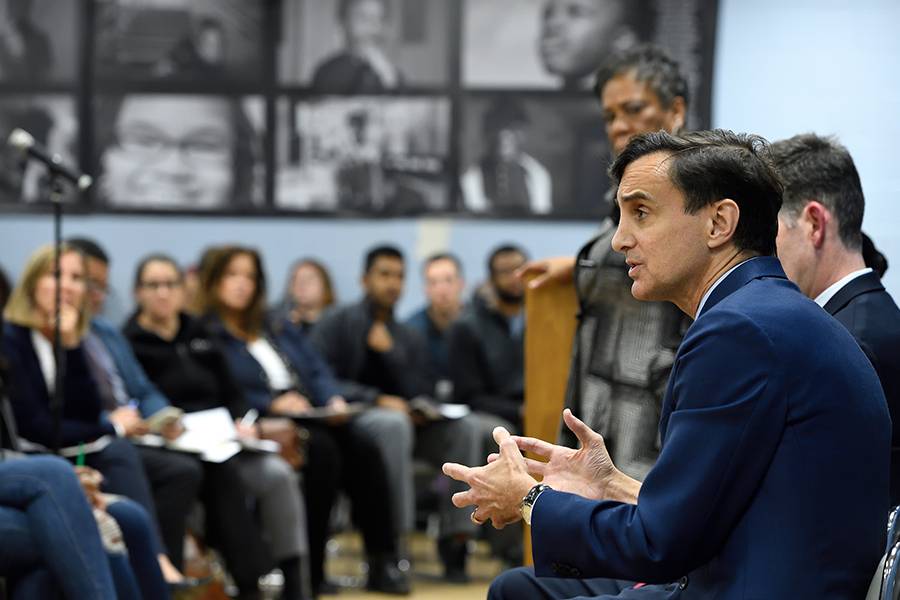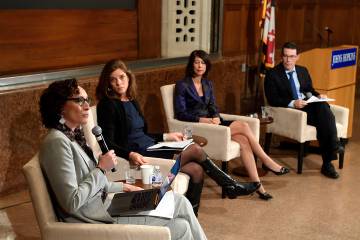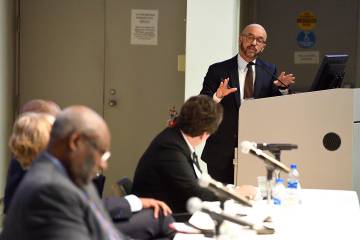Johns Hopkins University leaders responded to questions from community members, students, and others Nov. 13 at an open forum on security and policing, one in a series of public conversations hosted by the university about how best to address crime on and around JHU's Baltimore campuses.
The discussion focused on options being considered by the university to improve safety and security, a list that includes revisiting the idea of creating a state-authorized campus police department at Johns Hopkins similar to those found at peer institutions in Baltimore and across the country.
That possibility was first raised in March with a bill in the Maryland General Assembly, a response by Johns Hopkins to an increase in crime near its campuses and an assessment of the limitations of its current, multi-layered security operations. Ultimately the university and legislature elected to not act on the bill, determining that further consideration and discussion were necessary.
In his opening remarks at the open forum, JHU President Ronald J. Daniels said Hopkins is committed to involving the community as it considers options to strengthen the university's security operations.
"We've got to involve the community in any option that we pursue, not just to help us identify the most prudent solution at the start, but to be a key partner in how we implement a solution and in the review and accountability mechanisms we put in place going forward," Daniels said. "A university police department must be public-facing and publicly accountable."
Daniels noted that as this dialogue is taking place, crime remains a persistent issue, both in the neighborhoods near JHU's campuses and across Baltimore.
"The crime situation we face in our city and in particular in and around our campuses is serious," he said. "It's unrelenting and it is pernicious and it is unsustainable."
Daniels was joined at the event—which took place at the 29th Street Community Center in Baltimore's Abell neighborhood, near the university's Homewood campus—by Melissa Hyatt, vice president of security for Johns Hopkins, and Daniel Ennis, the university's senior vice president for finance and administration, whose portfolio includes security.
Ennis stressed that, if created, a university police department would be "only a portion, a piece of a very thoughtfully developed, designed, and invested system" of safety and security measures at Hopkins. He detailed the university's recent efforts to improve streetscapes, commercial vibrancy, transportation, lighting, and camera surveillance around its campuses. He also talked about efforts to create new pathways to jobs and economic opportunity for Baltimore residents.
Daniels likewise acknowledged that "policing and security are not and should not be the primary drivers of public safety or reductions in violence.
"High levels of violent crime reflect deeper, urgent social ills and economic disparities—poverty, unemployment, racial injustice, health disparities, housing, education, and so forth," he added. "This is a very complex issue that we have in Baltimore around our violent crime, and it's not just about policing."
Daniels noted that the university has made a number of significant investments over the past several years to address those issues, including partnerships with Baltimore City Public Schools as well as HopkinsLocal and BLocal, economic inclusion efforts focused on creating jobs and economic opportunity for residents of some of Baltimore's most distressed neighborhoods.
Hyatt said that, since joining Hopkins in April after two decades with the Baltimore Police Department, she has been working to strengthen university security, by improving training and updating policies and protocols.
But she added that there are limits to what security officers can do—they cannot operate body-worn cameras the way sworn police can, nor can they operate emergency vehicles. They also don't have access to police department dispatch data. And because they are not sworn police officers, they do not have law enforcement authority. Their primary role is to patrol the community, deter crime, and, in case of an incident, to radio for help from police.
"We understand that we have limitations in our current structure," she said. "We recognize that there are additional tools that are available to us if we were a university police department that could make us more progressive, more efficient, and more transparent to the community.
"My security team," she added, "views itself as an integral part of Baltimore and takes pride in keeping people safe on and around our campuses. You have my commitment that regardless of what the future holds in terms of the status of our security organization, whether we remain as we are or we transition into a sworn police department, that we are committed to safety on and about our campuses and in our communities."
Johns Hopkins continues to engage in conversations on safety and security, through a fall discussion series called The Challenges of 21st Century Policing, which to date has included panels of national experts discussing the current landscape of university policing, police accountability, and constitutional policing. The final event in the series, which will examine the root causes of crime from a public health perspective, will take place on Dec. 5 from 1 to 3 p.m. at the Bunting-Meyerhoff Interfaith and Community Service Center near the university's Homewood campus.
A second community forum took place in East Baltimore tonight at the Weinberg Community Center.
For more information or to provide feedback on safety and security at Johns Hopkins, visit publicsafety.jhu.edu.
Posted in University News
Tagged campus safety and security











